The GOP must get on board with stopping Donald Trump. The man is selling out this country piece by piece.
He must be impeached. As soon as possible.
From his Twitter rants today.

Trump’s latest Tweets
Why does Trump want to be Kim Jong-un’s friend?
why does he trust Putin over American intelligence?
Why is he still obsessed with Hillary Clinton and Barack Obama? Why does he feel so inadequate?
Why is he still in office?


